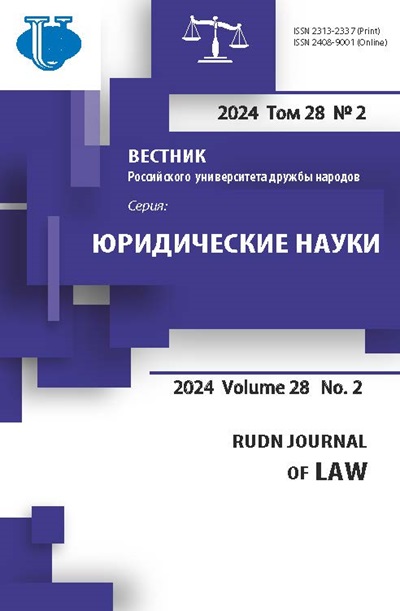Supervisory bodies in the systems of power in Russia and certain foreign countries: Comparative analysis
- Authors: Rokityanskii S.G.1,2
-
Affiliations:
- Public Prosecutor’s Offices of the Moscow Region
- University of the Prosecutor General’s Office
- Issue: Vol 28, No 2 (2024)
- Pages: 297-315
- Section: STATE AND LAW IN CONTEMPORARY WORLD
- URL: https://journals.rudn.ru/law/article/view/39491
- DOI: https://doi.org/10.22363/2313-2337-2024-28-2-297-315
- EDN: https://elibrary.ru/JESQJM
- ID: 39491
Cite item
Full Text
Abstract
The significance of law enforcement cannot be understated in any state, and diverse models and traditions of law enforcement have evolved within different legal sustems. The status of the Procuracy in the Russian Empire, the Soviet Union and modern Russia, has been consistently characterized by its own independent power for supervising legality, including the actions of government officials. This contrasts with the European and Anglo-American legal systems where the concept of “general supervision” is not present and prosecutors do not possess equivalent powers. In the socialist model of China, an independent system of supervisory bodies has been established separately from the procurator’s office to oversee the activities of government officials. Each model exhibits distinct ontological, structural and organizational features, and a comparative analysis of their accumulated experiences facilitates the identification of their respective advantages and disadvantages, underscoring the relevance of this study. The research aimes to identify and analyze the commonalities and differences among four organizational models for ensuring the rule of law. Notably, the empirical basis for comparing supervisory authorities emphasises the state superiority function, irrespective of the body responsible for its execution (functional approach), rather than external similarities such as the name "prosecutor's office" or "prosecutor". The study draws from authentic legal texts, regulations, authoritative doctrinal commentaries, relevant judicial practices, and official interpretations of foreign legislation. The outcomes of the research lead to informed conclusions regarding the distinctiveness of the Russian model of the Procuracy, which incorporates several advantages from each foreign model, complements them with its own features and is thus capable of embracing positive experiences, regardless of their origins, to effectively filfill its mission.
About the authors
Sergei G. Rokityanskii
Public Prosecutor’s Offices of the Moscow Region; University of the Prosecutor General’s Office
Author for correspondence.
Email: Rocky1979@rambler.ru
SPIN-code: 6641-3102
Deputy Prosecutor of the Moscow Region, 3rd class State Counselor of Justice, Prosecutor's Office of the Moscow Region; postgraduate student, University of the Prosecutor's Office of the Russian Federation 5 build. 1 Maly Kiselny per., Moscow, 107031, Russian Federation
References
- Barber, N.U. (2020) Separation of powers and the Constitution of Great Britain. Pravo. Journal of the Higher School of Economics. (1), 3-17. (in Russian).
- Chernyaev, A.V. (2016) At the dividing line of political thought in Russia: Correspondence between Andrei Kurbsky and Ivan the Terrible. Philosophy Journal. 9(1), 80-100. (in Russian).
- Giabardo, C.V. (2017) Disobeying Courts’ Orders - A Comparative Analysis of the Civil Contempt of Court Doctrine and of the Image of the Common Law Judge. Journal of Сivil Law Studies. 10(1), 35-59.
- Golovko, L.V. & Mathieu, B. (eds.). (2018) The Court and the State. Moscow, Statute Publ. (in Russian).
- Gray, J.C. (1895) Judicial Precedents. A Short Study in Comparative Jurisprudence. Harvard Law Review, 9 (1), 27-41.
- Lesiv, B.V. (2021a) Credibility of the Anglo-American Court Orders and their Effective Enforcement: What’s the Secret? Russian Justice. (6), 52-62. (in Russian).
- Lesiv, B.V. (2021b) The Ontological Emphasis of the Jury in Anglo-American Law and its Influence on the O. Holmes’ Legal Thought. Legal Science: History and Modernity. (4), 162-171. (in Russian).
- Lesiv, B.V. (2021c) Theoretical and Historical Reservations Required for Adequate Perception of the O.W. Holmes’ Legal Ideology. History of State and Law. (5), 17-27. (in Russian).
- Lesiv, B.V. (2022) Foundations of Legal Realism: O.W. Holmes’ Doctrine of Judicial Law-Making. Diss. Candidate of Legal Sciences. Moscow, Lomonosov Moscow State University. (in Russian).
- Merryman, J.H. (1996) The French Deviation. The American Journal of Comparative Law. 44(1), 109-119.
- Mou, Y. (2017) Overseeing Criminal Justice: The Supervisory Role of the Public Prosecution Service in China. Journal of Law and Society. 44(4), 620-645.
- Petrovskii, S.A. (1875) On the Senate’s Role During the Reign of Peter the Great. Historical and legal research. Moscow, University Publ. (Katkov and Co.). (in Russian).
- Rokityanskii, S.G. (2022) The main models of the state-legal status of the prosecutor’s office. England and the USA. Judge. 1(133), 57-61. (in Russian).
- Roiphe, R.A. (2020) Typology of Justice Department Lawyers' Roles and Responsibilities. N.C. L. Rev. 98, 1077. Режим доступа: https://scholarship.law.unc.edu/cgi/viewcontent.cgi? article=6794&context=nclr (дата обращения: 20.07.2023).
- Soloviev, A.A. (2013) The general outlook of the French model of administrative justice. RUDN Journal of Law. (3), 142-151. (in Russian).
- Serov, D.O. (2011) Peter the Great and Public Prosecutor’s Office of France. Legality. 1(915), 58-60. (in Russian).
- Spengler, O. (2017) The Decline of Western World: Essays on the Morphology of World History. Complete edition in one volume Moscow, Alpha-Book Publ., 2017. (in Russian).
- Steiner, H.A. (1950) The People’s Democratic Dictatorship in China. The Western Political Quarterly. 3(1), 38-51. https://doi.org/10.2307/442412
- Troitskaya, A.A. (2020) Comparative method in the science of constitutional law and decisions of constitutional control bodies. Diss. Doctor of Legal Sciences. Moscow, Lomonosov Moscow State University. (in Russian).
Supplementary files















